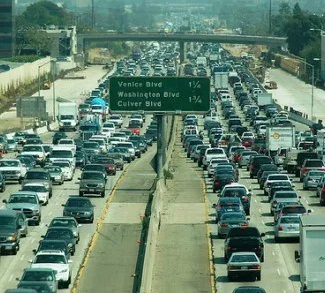Commutes in America are a tale of two cities — those who take public transit face commutes in some ares that are nearly twice as long as those who drive to work.
In 12 of the country’s 20 largest metropolitan areas, drivers get commutes that are 12 to 26 minutes faster than transit riders, whose average commutes are longer than 50 minutes, according to an analysis of commuting times by Geotab, a firm that promotes tech-connected vehicles
Californians relying on the Los Angeles Metro Rail or buses need an average of 54 minutes to get to work, the longest commute in the country, followed by straphangers in Atlanta, Dallas, New York, Detroit, and Orlando which are in a five-way tie for second place with 53 minutes, Geotab’s “Time to Commute” study shows.
Motorists on the other hand, zip into work more quickly than riders in cities bereft of expansive rail systems.
Los Angeles’s 1.2 million drivers commute an average of only 33 minutes — despite the area's legendary traffic. The average commute for Dallas’s 558,846 drivers is only 30 minutes — and 98 percent of them can get to work in under an hour.
Yet tens of thousands of straphangers living in the outskirts of cities face commutes that rival a "Game of Thrones" episode.
One out of four city dwellers who don’t use cars in LA, New York, Atlanta, Orlando, Dallas, Houston, and San Diego take more than an hour to find their way to work. In Detroit, nearly one out of three transit riders experience hour-long journeys.
A small number of commuters are wealthy or fortunate enough to live close to their employer. Only 7 percent of Angelenos, or 8,863 people, and only 6 percent of New Yorkers, or 112,134 people, regularly have commutes under 30 minutes. A mere 3,341 Atlantans, or 10 percent of transit riders, can depend on arriving at work within a half hour.
Having a vehicle is a necessity in car-dependent cities such as San Diego and Atlanta if you can afford it.
In San Diego, which Geotab named the city with the shortest commute time, the average commute time is 26 minutes, half as long as their neighbors without cars. The average commute for Atlanta’s drivers is 35 minutes — and 43 percent of Peachtree City drivers can get to work in under 30 minutes.
And here's why Atlanta has been so slow to expand its transit: Geotab's numbers show that 39 times more drivers have sub-half-hour commutes than transit riders in Atlanta.
“This research also highlights the need for ongoing investment in transportation infrastructure across the country,” said Maria Sotra, vice president of Marketing at Geotab. “The stark contrast between how many cities are easily reachable by car versus those that are easily reachable by public transit suggests that there is still some way to go.”
Geotab analyzed American Community Survey responses from 2012 to 2016 in census tracts in the 20 largest American metropolitan areas to determine commuter times. The numbers show the need for rail and bus networks that stretch beyond city centers and into city outskirts and suburbs where people have been moving for less expensive housing.






